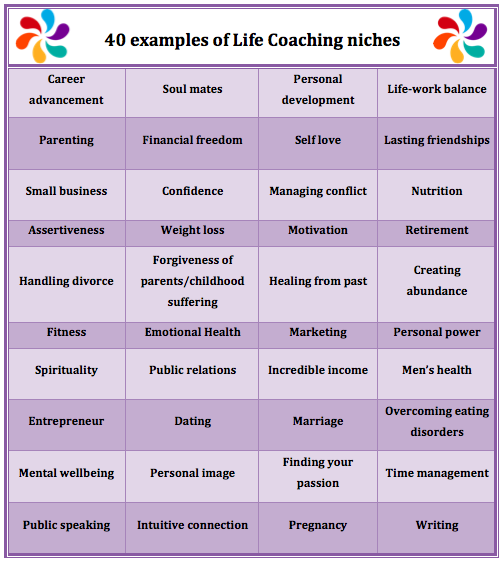

How do I become a life coach?
Table of Contents
Have you ever wondered, ‘how do I become a life coach?’ Coaching is a fantastic industry that allows you to connect with and help so many people, it’s no wonder it’s the fastest growing industry on the planet!
For decades the title of Coach was attributed to people who helped boost the mindset and performance of athletes. A coach was there to help individuals excel or to bring teams together as a collaborative unit. The reason a sports coach is such a vital part of performance excellence is that an athlete isn’t able to monitor themselves closely when they work. Even training in front of a mirror or watching playback footage can only get them so far. It takes an outsider to be able to spot flaws, patterns and irregularities in behaviour and encourage an athlete to work to their full capacity, which might be higher then they imagine.
As more and more people look for excellence and fulfilment in their personal lives, through pursuing their dream job, having amazing relationships, achieving perfect health, starting their own business or earning a six-figure income, the need for life coaches is booming.
Having a life coach works on the same principle as having a sports coach. It’s the process of hiring someone outside your experience to point out the traps you are setting, showing options for growth and uncapping your true potential, simply through having a clearer picture of where you want to go.
Let’s face it, we can get emotional sometimes, and when that happens intelligence gets thrown out the window. We can get stuck into making the same incorrect choices over and over with no idea why or how to change it. The lack of clarity occurs because we are too close to the subject or we are emotional. A coach is able to sort out the facts from the opinions and offer you solutions, or better yet, give you better ways to find your own way forward. All this happens much more effectively and rapidly then you could ever manage alone.
No matter what you are hoping to achieve, a life coach can be the key to unlocking your goals in a safe, effective and empowering way.
If you are interested in personal growth and development then you are probably interested in knowing what it takes to be a life coach yourself.
It’s a great lifestyle, you work for yourself, make your own hours and get to help people all day. As an added bonus it also keeps you on your mental toes. In order to be a great coach you need to be achieving success yourself. As a coach you will allow your interaction with your clients to challenge you and encourage your own growth and achievements.
The results speak for themselves. The rapid growth of the life coaching profession in the last ten years is a testament to the great results individuals and companies are getting from taking up he services of a Life Coach, holding themselves accountable and driving their performance results forward to heights that are almost too good to be true.
My personal journey to become a life coach started with two things. I had an incredible passion for learning, especially learning about personal development and how the mind works, and I had a passion for helping people.
When it comes to knowing if you have what it takes to be a life coach, here is a quick breakdown of the essential traits. Check in with these to see if you have a Life Coach burning inside you.
You know if you can make a career out of becoming a life coach if YOU HAVE:
- A desire to help people overcome their own problems (not fix their problems for them).
- A curious mind. You like discovering, learning and testing the known (and unknown).
- The courage to step outside your comfort zone and expose yourself to new challenges on a regular basis.
- The ability to consider all the ramifications of possible choices and take pathways that are safe and healthy for all involved.
- Creative thinking ability to find multiple ways around blocks and obstacles so there are always options and choices available.
- The desire to work on yourself and continue to grow as a person.
- Empathy or intuition towards others.
- The ability to actively listen to what someone is saying.
- Good time management skills or the ability to learn them.
If you have what it takes you are probably interested in knowing more.
How to Become a Life Coach
Life Coaching doesn’t require a licence and it’s an unregulated industry (for now). That’s because as a life coach you don’t have any power over your clients. They and they alone make all their choices take on actions. The role of a life coach is to offer suggestions and viewpoints that are positive and motivating and let their clients do with it what they will.
Unlike a trained and professional therapist you do not offer counselling, diagnoses or medication, or even advice. You help them discover their own answers through questions and suggestions. Life Coaching works on the basis that people already know what they want, what they like and what their values are (at least on a subconscious level). When people are out of balance or in an emotional state they can start to ignore their personal preferences.
When these issues are addressed and revealed to the client on a conscious level it empowers them to start taking action towards things they are passionate about and spend less time on the things they don’t enjoy. In most cases you do not even need to hear a person’s story. All you need to know is where they want to be in life, and help them design their own choices for how they want to get there.
Even though it’s not legally required, if you are serious about being a life coach I would strongly recommend getting professional coaching training, even if it is just so you are able to get better results. Being a certified coach also shows your commitment to the profession and will attract committed clients.
If you sign up for the right coach training you will get access to a big toolkit of ways to help break down your clients challenges and offer them positive advice.
Coach Now provides a vast toolbox using positive mindset and Neuro-Linguistic Programming (NLP) techniques as well as access to some of Australia’s best coaches, a lifetime resit policy to maintain your growth and understanding, and a fellowship of life-coaches-in-training you can use as a support network.
With over 20 years of proven results in the field, my Coach Now training provides you everything you need including hands-on experience and scripts to get you moving in your new career as fast as possible.
In order to gain your certification as a Life Coach with us you need to complete a set number of practice clients, have you work checked over by our senior coaches and complete an exam to prove you have retained the knowledge from your practice. This is something not many Australian coaching companies do and I think it is absolutely essential. Practice coaching gives you room and flexibility to find your feet, get your confidence and also generate some amazing leads and testimonials through your great results.
It’s also a great test for you for how motivated you are to actually go through with this. If you can’t commit yourself to train correctly, it’s definitely not worth you quitting your day job for.
Coaching involves far more than listening to people. It’s an incredible responsibility so I’d like you to consider all the aspects of it before you dive in.
Your role as a life coach is to establish ethical boundaries before proceeding to ensure there are no negative side effects. Everything needs to be taken into account no matter how small and impact considerations will include the client (health, wealth and mental state), their immediate family and relationships, their business associates as well as the environment.
Creating awareness through education. You will be giving your client education elements so they can understand their behaviour and make changes as soon as they gain conscious awareness of their behaviour.
Active listening that includes powerful questioning to get to the core of an issue or allow a client to realise the faults in their beliefs or suggestions.
Goals. You will also need to master goal setting and effective goal management to help your clients create realistic and risky goals as well as effective means to reach them.
Your clients results. In NLP we believe there is no such thing as a resistant client, only a resistant coach. If you clients are not getting results it’s up to you to check in on your beliefs and behaviours to see where you are going wrong.
Business. You will be operating your own small business. You need to be ready for wealth, organised, dedicated and cover your business set up, marketing and branding.
If all this has you ready to get started, here’s how to go about it.
STEPS TO BECOME A LIFE COACH
1: Find the right Life Coach Training.
Almost all coaching companies offer free, or low-cost weekend events that cover coaching or personal development. This is an amazing way to check out the company, get to know the team and learning methods before you commit your time and money to their training.
It’s also a great way to mingle with like-minded people and gain self-awareness. These will be essential for your life coaching profession.
Different companies have different teaching styles so pick the one that both challenges you and gets results. If the weekend turns out to be a sales pitch, put it in your training basket of how not to treat your clients and get yourself to another event.
Live It Now in Sydney is a great way to check out Neuro-Linguistic Programming and the Your Future Now courses, which offer hands-on interactive learning, live training walk-throughs and provide elements for genuine nurture and support for people’s emotional health.
Whatever company you choose make sure you do your research. A really good training course will give you multiple opportunities to practice and apply your skills both in the class and in real life.
2: Find your niche.
The field of coaching is so vast there is literally room for everyone. When each life coach hones in on their particular speciality it creates an open market, rather than a competitive one, with clients able to choose exactly the area of need they have and be looked after by an expert.
Once you have completed your coaching training and gained your Life Coach certification you can delve into your own niche.
Your niche is typically what you are most passionate about and will usually draw on your personal strengths, challenges you have overcome (just note that you must have overcome them), life experience or previous qualifications.
If you don’t know your niche before you start your training course you will by the end. Usually new coaches find their practice clients all present the same challenges or blocks, and helping the first clients and seeing their results ignites a quest to continue working with more of the same people. It’s another great reason to take your practice clients very seriously.
Your niche gives you a point of differences, allows you to find and market to potential clients very easily and gives you focus and drive in your business.
Coaching will become your small business, and your niche is what will allow you to move up the business ranks from start-up to expert, to authority to mentor. As you hone in and practice your skills in one area you become more and more qualified and credible. Over time this increases your capital, gives you the ability to pick and choose your clients and gives you a more global platform to work from.
Niche examples are endless, they are as unique and flexible as you and your skill set. Here are a few examples of possible niches.
3: Organising payment
One of the things you will have compared when you looked at different companies was price. Your favourite training program might not be the cheapest, it also might not be the most expensive. If their prices are outside your current budget, see if they have a payment plan. Usually you will get a discount if you are able to pay the entire price upfront. If you need it, an established payment plan can help make your training affordable in fortnightly allotments.
The most expensive programs are not necessarily the best. They should offer significantly more value for a higher price tag, like supervised coaching training, one-on-one support and additional classes or courses that go hand in hand with your training.
You should also look for training courses that have coaching sessions built in. It is important that you have a coach yourself so that you can experience coaching and keep yourself moving in an upward direction to stay ahead of your client’s progress.
As well as training costs you will need to consider the costs of starting up your own business, investing in website space and generating leads.
You can save costs by working from home. You will need to get an ABN as soon as you can to accept payments, get a domain and establish yourself as a business owner.
While you might be keen to get going I recommend keeping your current job (at least part-time) until you find your feet and establish yourself as a fully-fledged Life Coach.
Of course once you establish yourself and your niche there is no end to what you can do or how you can positively connect with people. It’s about keeping an open mind understanding your unlimited potential for excellence.
Kindest regards,
Matt Catling







